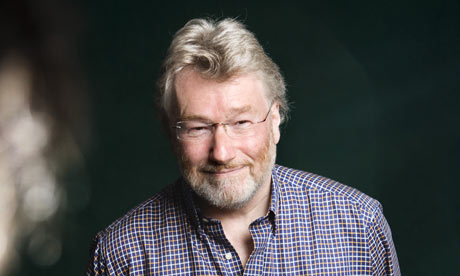 Where is the technology of the Culture when it’s most needed? Nothing more to add.
Where is the technology of the Culture when it’s most needed? Nothing more to add.
From the Guardian:
In Iain M Banks’s finest creation, the universe of the Culture, death is largely optional. It’s an option most people take in the end: they take it after three or four centuries, after living on a suitably wide variety of planets and in a suitably wide variety of bodies, and after a life of hedonism appropriate to the anarcho-communist Age of Plenty galactic civilisation in which they live; they take it in partial, reversible forms. But they take it. It’s an option.
Sadly, and obviously, that’s not true for us. Banks himself has released a statement on his website, saying that he has terminal cancer. He tells us as much with his usual eye for technical detail and stark impact:
I have cancer. It started in my gall bladder, has infected both lobes of my liver and probably also my pancreas and some lymph nodes, plus one tumour is massed around a group of major blood vessels in the same volume, effectively ruling out any chance of surgery to remove the tumours… The bottom line, now, I’m afraid, is that as a late stage gall bladder cancer patient, I’m expected to live for ‘several months’ and it’s extremely unlikely I’ll live beyond a year.
So there you have it.
Anything I write about Banks and his work, both as Iain Banks and Iain M Banks (for the uninitiated, Iain Banks is the name he publishes his non-genre novels under; Iain M Banks is for his sci-fi stuff), will ultimately be about me, I realise. I can’t pretend to say What His Work Meant for Literature or for Sci-Fi, because I don’t know what it meant; I can’t speak about him as a human being, beyond what I thought I could detect of his personality through his work (humane and witty and fascinated by the new, for the record), because I haven’t met him.
With that in mind, I just wanted to talk a bit about why I love his books, why I think he is one – or two, really – of our finest living writers, and how his work has had probably more impact on me than any other fiction writer.
I first read The Wasp Factory in about 1996, when my mum, keen to get me reading pretty much anything that wasn’t Terry Pratchett, heard of this “enfant explosif” of Scottish literature. It’s a slightly tricky admission to make in a hagiographical piece like this one, but I wasn’t all that taken with it: it felt a little bleak and soulless, and the literary pyrotechnics and grand gothic sequences didn’t rescue it. But then I read Excession, one of his M Banks sci-fi novels, set in the Culture; and then I read The Crow Road, his hilarious and moving madcap family-history-murder-mystery set in the Scottish wilds; and I was hooked.
Since then I’ve read literally everything he’s published under M Banks, and most of the stuff under Banks. There are hits and misses, but the misses are never bad and the hits are spectacular. He creates vivid characters; he paints scenes in sparkling detail; he has plots that rollick along like Dan Brown’s are supposed to, but don’t.
And what’s most brilliant, at least for me as a lifelong fan of both sci-fi and “proper” literature, is that he takes the same simple but vital skills – well-drawn characters, clever writing, believable dialogue – from his non-genre novels and applies them to his sci-fi, allied to dizzying imagination and serious knowledge.
Read the entire article after the jump.
Image: Iain Banks. Courtesy of the Guardian.
